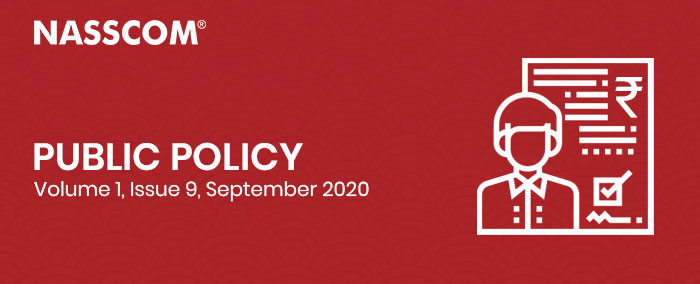 |
|
| Submissions and Representations |
|
 |
|
|
|
|
|
|
 |
|
Ministry of Labour and Employment: NASSCOM submits feedback on Code on Wages (Central) Rules, 2020 |
|
|
|
|
|
 |
|
|
|
|
|
The Ministry of Labour and Employment, on 7 July 2020, published the draft Code on Wages (Central) Rules, 2020 for public comments. The rules prescribe the manner of fixing minimum wages, process of fixing floor wages, process of deduction against advance, etc. Given the potential impact, NASSCOM reached out to members seeking their views and suggestions on the same (details here). Based on inputs received from the members, NASSCOM submitted its feedback to the Ministry. In our submission, we have recommended that the working hours proposed under the rules should be made in line with the provisions of Shops and Establishment Act of various states, to ensure uniformity. We have also suggested that the responsibility of making payment of bonus should be on the contractor and not on the principal employer (read more). |
|
|
|
|
|
|
 |
|
Niti Aayog: NASSCOM submits feedback on the Working Document on Responsible AI |
|
|
|
|
|
 |
|
|
|
|
|
Niti Aayog released a working document titled Towards Responsible #AIforAll for public comments on 21 July 2020. The document analyses the impact of AI on individuals and society and arrives at certain principles that will act as guardrails to guide the growth of the sector. Based on inputs received from the members, NASSCOM submitted its feedback to Niti Aayog on 28 August 2020. In our submission, we have suggested inclusion of principles to further ethical purpose & social benefit and to promote open data & fair competition (read more). |
|
|
|
|
|
|
 |
|
MyGov: Submission on revamping existing Customs Laws and Notifications |
|
|
|
|
|
 |
|
|
|
|
|
During the Budget speech, the Hon’ble Finance Minister had announced to undertake a review of existing customs laws and procedures, to identify those notifications which may have outlived their utility or have become outdated and to align them with the needs of today. Based on the inputs received from members, NASSCOM submitted detailed recommendations to MyGov on 21 August 2020. As part of our representation, we have requested the government to draft the notifications in a simplified language and also to explain the effect of amendment (read more). |
|
|
|
|
|
|
|
|
|
|
|
|
|
 |
|
IT-ITeS Export Competitiveness: Interaction with Minister of Commerce and Industry |
|
|
|
|
|
 |
|
|
|
|
|
On 19 August 2020, NASSCOM had an interaction with Shri. Piyush Goyal, Minister of Commerce and Industry, to discuss policy measures to boost export competitiveness of the Indian IT-ITeS industry. Enabling long term remote working, addressing Goods and Service Tax (GST) related concerns, relaxing restrictions on telecom connectivity, nurturing ER&D industry and improving EoDB are the key themes that were discussed. Following the meeting, further discussion was held on the subject with the industry and ministry officials. Based on the discussions, a detailed note was submitted to the Ministry of Commerce on 27 August 2020 (read more). |
|
|
|
|
|
|
|
|
|
 |
|
NASSCOM and DSCI depose before the Joint Parliamentary Committee on Personal Data Protection Bill, 2019 |
|
|
|
|
|
 |
|
|
|
|
|
NASSCOM and DSCI were called to depose on the Personal Data Protection Bill, 2019 (PDP Bill) before the Joint Parliamentary Committee (JPC) chaired by Smt. Meenakshi Lekhi, MP. On 26 August 2020, NASSCOM and DSCI presented the key suggestions made in their submission dated 26 February 2020 to the JPC, inter alia relating to the inclusion of certain wide definitions (e.g for financial data and health data), the scope of sensitive personal data under the bill, the implications of categorising certain types of personal data such as financial data, official identifiers and health data as sensitive personal data, lack of clarity on the treatment of foreign data, the inclusion of non-personal data within the scope of the bill and the roles and functions of the NPD Authority (read more). |
|
|
|
|
|
|
|
|
|
 |
|
NASSCOM Webinar on e-Invoicing with GST officials |
|
|
|
|
|
 |
|
|
|
|
|
On 21 August 2020, NASSCOM, in association with Deloitte India as knowledge partner, organised an interactive live webinar on e-invoicing with officials of Goods and Service Tax Network (GSTN) and the GST Policy Wing. The session witnessed participation from around 150 participants. During the webinar, the key issues faced by IT/ITeS sector relating to implementation of e-invoicing under GST from 1 October 2020 were highlighted. These inter alia include concerns on specific validation relating to document data, clarity on ‘bill-to-ship’ transactions, generation of e-invoice under reverse charge mechanism and allowing e-commerce operators to raise e-invoice on behalf of the seller. Following this webinar, we made a detailed submission to the GST Policy Wing and GSTN on 28 August 2020 requesting clarity on certain queries relating to implementation of e-invoicing (read more). |
|
|
|
|
|
|
|
|
|
 |
|
Seeking inputs: NASSCOM-DSCI Discussion Paper on Future of Encryption in India |
|
|
|
|
|
 |
|
|
|
|
|
NASSCOM and DSCI have recently launched a Discussion Paper on the Future of Encryption in India. Using the premise of recent developments relating to personal data protection, cyber-security and prevention of online harms, the Discussion Paper explores possible paths towards a well-balanced regulatory framework for encryption in India – one which balances the needs of individual privacy and State access to communications information. We trust the industry will find the paper to be timely, given that a number of important and concurrent developments have taken place over the past year, materially impacting the manner in which companies use and deploy encryption products. These developments include the increasing threat of large scale cyber-attacks from both State and non-state actors and the consequent scrutiny of Over-the-top (OTT) applications by the government, the introduction of the PDP Bill in the Parliament of India and the ongoing review of Information Technology Act, 2000 and the proposed amendments to the Information Technology (Intermediary Guidelines) Rules, 2011. All of these provide both the urgency and opportunity, to engage and shape the future of encryption and privacy in India. Kindly share your inputs with indrajeet@nasscom.in before 30 September 2020. |
|
|
|
|
|
|
|
|
|
 |
|
NASSCOM Discussion Paper on Amendments to the Information Technology Act, 2000 |
|
|
|
|
|
 |
|
|
|
|
|
In light of the Ministry of Electronics and Information Technology (MeitY)‘s ongoing review of the Information Technology Act, 2000 (IT Act) to address the regulatory challenges posed by emerging technologies, NASSCOM will be releasing a discussion paper on potential amendments to the IT Act. The paper inter alia considers themes of intermediary liability, content moderation, data protection, cyber security, and regulation of emerging technologies, with a view to discussing potential amendments that could be considered in light of other developments such as the introduction of the PDP Bill in the Parliament of India. For more information, please contact komal@nasscom.in. |
|
|
|
|
|
|
|
|
|
|
|
|
|
 |
|
NASSCOM-DSCI Policy Roundtable Series on Non-Personal Data Governance Framework |
|
|
|
|
|
 |
|
|
|
|
|
NASSCOM and DSCI will be organising a series of Policy Roundtables on the draft recommendations of the Committee of Experts on Non-Personal Data Governance (NPD Committee), starting 3 September 2020. The roundtables will aim to bring together various industry sub-groups including the GCC sector, the BFSI sector and start-ups, amongst others – and discuss the way forward on creating a well-balanced framework for governing access, usage and sharing of non-personal data in India. Recommendations coming out of the roundtables, will go towards shaping NASSCOM and DSCI’s input before the NPD Committee. For more details, please write to indrajeet@nasscom.in (read more). |
|
|
|
|
|
|
 |
|
Webinar on IP Awareness for Startups and IT MSMEs |
|
|
|
|
|
 |
|
|
|
|
|
Continuing our efforts to raise awareness on the significance of Intellectual property (IP) for businesses, NASSCOM in association with the Cell for IPR Promotion and Management (CIPAM) and K&S Partners, will be organising a webinar to create awareness about various intellectual property laws, patentability criteria for computer related inventions and Government initiatives to promote and support IP ecosystem in India. Dates are being finalised and will be communicated soon. For more details, please write to deepak@nasscom.in. |
|
|
|
|
|
|
 |
|
Seeking inputs: Pre-Budget Memorandum 2021-22 |
|
|
|
|
|
 |
|
|
|
|
|
NASSCOM has started the process of preparing its Pre-Budget Memorandum 2021-22 to be submitted to Ministry of Finance. We also plan to submit an updated memorandum to highlight issues faced by our industry under the Central Goods & Services Tax Act (CGST Act). Please provide your inputs/ suggestions to tejasvi@nasscom.in and jayakumar@nasscom.in latest by 30 September 2020 (read more). |
|
|
|
|
|
|
 |
|
Seeking inputs: Draft Framework for recognition of a Self-Regulatory Organisation for Payment System Operators |
|
|
|
|
|
 |
|
|
|
|
|
The Reserve Bank of India (RBI) released the Draft framework for recognition of a Self-Regulatory Organisation (SRO) for Payment System Operators (PSOs) on 18 August 2020. The SRO will be a non-governmental organisation that will be responsible for setting and enforcing rules for PSOs. The SRO will cover operators in all segments of payment systems and observe best practices on security, customer protection and competitiveness. It will serve as a two-way communication channel between the PSOs and the Reserve Bank and is expected to address concerns beyond the narrow self-interest of the industry, such as to protect workers, customers or other participants in the ecosystem. The Central Bank has invited comments on the draft framework from all stakeholders by 15 September 2020. Members are requested to kindly share their inputs to komal@nasscom.in by 9 September 2020 (read more). |
|
|
|
|
|
|
 |
|
Seeking inputs: TRAI Consultation Papers on Unbundling of Differential Layers through Differential Licensing and Enhancing Broadband Connectivity |
|
|
|
|
|
 |
|
|
|
|
|
The Telecom Regulatory Authority of India (TRAI), on 20 August 2020 issued two consultation papers. The first paper is on ‘Enabling Unbundling of Different Layers Through Differential Licensing. The paper focuses on issues related to unbundling of network service layers and service delivery layers to encourage investments. It also seeks comments on whether any additional measures or obligations needs to be imposed on uniform licensees for sharing their infrastructure with VNO licenses for mobile services. The second consultation paper is on ‘Roadmap to Promote Broadband Connectivity and Enhanced Broadband Speed’. Some of the issues that are highlighted in the consultation paper includes review of broadband definition, identifying innovative approaches for infrastructure creation to ensure last mile connectivity, additional measures that are needed to promote broadband connectivity and enhancing broadband speed. The last date for sending inputs to TRAI is 17 September 2020 and 21 September 2020 respectively. Kindly share your feedback, if any, on these consultation papers to deepak@nasscom.in and komal@nasscom.in latest by 7 September 2020 and 10 September 2020 respectively (read more). |
|
|
|
|
|
|
 |
|
Seeking inputs: Draft Health Data Management Policy |
|
|
|
|
|
 |
|
|
|
|
|
The National Health Authority (NHA) released the draft Health Data Management Policy (HDM Policy) on 26 August 2020 for public comments. The draft policy is a step towards realising the National Digital Health Mission (NDHM)‘s guiding principle of “Security and Privacy by Design” for the protection of individuals’ data privacy. Interplay between the NHD policy and the PDP bill, and the design aspects of the proposed Health Id are two important areas that need consideration. The last date for sending inputs is 10 September 2020. Please share your inputs with indrajeet@nasscom.in and jayakumar@nasscom.in latest by 7 September 2020. |
|
|
|
|
|
|
 |
|
Seeking inputs: 13th All India Customs Consultative Group (CCG) meeting |
|
|
|
|
|
 |
|
|
|
|
|
Directorate General of Export Promotion (DGEP) is in the process of scheduling the 13th All India Customs Consultative Group (CCG) meeting in September 2020. In order to prepare the agenda for discussion, DGEP has invited inputs from NASSCOM. The mandate of the CCG is to suggest changes and improvements in customs related procedure and policies. Members are requested to kindly share their inputs, in line with CCG’s mandate, with tejasvi@nasscom.in latest by 4 September 2020 (read more). |
|
|
|
|
|
|
|
|
|
|
|
|
|
 |
|
DoT forms Joint Working Group on Work-from-Home (WFH) |
|
|
|
|
|
 |
|
|
|
|
|
The Department of Telecommunications (DoT) has set up a Joint Working Group (JWG) to look into industry requirements related to WFH for entities that are registered as Other Service Providers (OSP).The JWG comprises of senior DoT officials, NASSCOM and members of the IT-BPM industry. Some of the issues on which the JWG is expected to deliberate include the need to make permanent the current relaxations under the OSP Guidelines relating to WFH, enabling employees to work from anywhere instead of home locations, and adoption of cloud based solutions for better productivity, etc. (read more). |
|
|
|
|
|
|
 |
|
Compliance with DoT’s WFH Reporting Requirements |
|
|
|
|
|
 |
|
|
|
|
|
The DoT vide notification (No.18-/5 2015-CS-1 pt) dated 21 July 2020, has extended the WFH relaxations for new entities registered as OSPs, till 31 December 2020. The DoT now seeks to know the status of WFH being offered by OSPs. In this regard, you are requested to kindly submit these details with the DoT filed units/ TERM cells at the earliest, if not already shared (read more). |
|
|
|
|
|
|
 |
|
GST update: Invoice Reference Number (IRN) can be cancelled within 24 hours of generation |
|
|
|
|
|
 |
|
|
|
|
|
A webinar was conducted by GSTN and NIC on 14 August 2020 to discuss various aspects relating to e-invoicing. Among other things, it was clarified that IRN once generated can be cancelled within 24 hours of generation. If e-waybill is generated, e-way bill is first required to be cancelled before cancellation of IRN (read more). |
|
|
|
|
|
|
 |
|
GST update: Amendment to Section 50 of CGST Act Notified to Levy Interest on net GST Liability in Cash |
|
|
|
|
|
 |
|
|
|
|
|
Central Board of Indirect Taxes and Customs (CBIC), vide issue of Notification No. 63/2020-Central Tax dated 25 August 2020 has given effect to provision of section 100 of the Finance (No.2) Act, 2019 to amend Section 50 of CGST Act, 2017 w.e.f 1 September 2020. As per the amendment, interest on delayed payment of GST shall be levied on net tax liability after giving effect to Input Tax Credit (ITC) utilized for payment of taxes i.e. on GST portion discharged in cash (read more). |
|
|
|
|
|
|
 |
|
RBI releases Framework for Authorisation of Pan-India Umbrella Entity for Retail Payments |
|
|
|
|
|
 |
|
|
|
|
|
On 18 August 2020, the RBI released the ‘Framework for authorisation of pan-India Umbrella Entity for Retail Payments’. The framework envisages setting up pan-India umbrella entity/entities focussing on retail payments. Such entities will be expected to set-up, manage and operate new payment system(s) in the retail space comprising of ATMs, White Label Point of Sale (PoS) devices, Aadhaar based payments and remittance services and newer payment methods, develop standards and technologies and monitor related issues in the country and internationally. The framework has been released after considering inputs received in the course of a public consultation on the draft Framework released by the RBI earlier, wherein NASSCOM had sent its inputs as well (read more). |
|
|
|
|
|
|
|
|
|
|












